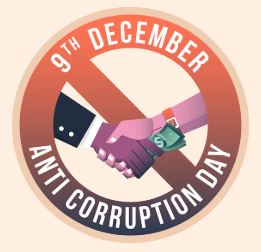Young citizens are demanding a united effort for greater transparency and accountability in the government as rampant corruption continues to undermine South Sudan’s potential.
International Anti-Corruption Day has been observed annually on 9 December since the passage of the United Nations Convention Against Corruption on 31 October 2003 to raise public awareness for anti-corruption.
Marial Paul, a Juba resident, expressed frustration over the pervasive corruption that he believes is eating away at the nation’s resources, leaving young South Sudanese with limited prospects for success. He stressed that the nation’s vast resources, particularly oil, could pave the way for national prosperity, but instead, much of the wealth is squandered or diverted into the personal accounts of senior government officials.
“Young people like me want to contribute to South Sudan’s growth but corruption affects everything,” he stated. “People are being placed in jobs they’re unqualified for, and the job market is shrinking, which weakens the economy.”
Jenifer Keji, another Juba resident, voiced similar concerns about the negative impact of corruption on young people’s access to basic needs.
“Without connections, you’re stuck,” she said, referring to the difficulty of finding work despite possessing the necessary qualifications. “If you do not know anyone, it is almost impossible to get hired no matter how skilled you are. Corruption has turned the job market into a closed circle.”
According to Keji, corruption has impeded progress in essential sectors like education and healthcare, further hampering the development of the nation’s youth.
Despite efforts like the passage of the South Sudan Anti-Corruption Commission Act 2023 which was meant to empower the commission to investigate and prosecute corruption cases, the commission has remained toothless and its efforts have faltered.
For his part, Ngor Kolong Ngor, Chairperson of the South Sudan Anti-Corruption Commission (SSACC), admitted that the commission faces major challenges, particularly a lack of funding, which limits its ability to address the crisis effectively.
Meanwhile, Luate Satimon Joel, Chief Executive Director of Integrity South Sudan, called on the youth to rise up and demand accountability from those in power in order to secure a future free of corruption.
He also criticized the government’s failure to pay civil servants salaries for nearly a year, calling it a severe blow to public sector morale. He also urged the government to reconsider the recent tax hikes, which have caused a sharp increase in the cost of living, further burdening citizens.
“It is very important to pay the civil servants. Of course, you work to be paid at the end of the day, but now somebody is going for more than a year without pay and that sends a bad signal. It is affecting the civil servants who have a lot of responsibility in feeding their children sending them to school and giving them food or medication,” Luate said. “I want to make a call to the Government of South Sudan, if possible, to reconsider the new tax rates which are causing an abnormal increase in the prices of goods and services in the market today.”
South Sudan grapples with one of the highest levels of corruption in the world, ranking 177 out of 180 countries on the 2023 Corruption Perceptions Index by Transparency International.
The theme for International Anti-Corruption Day 2024 was “Uniting with Youth Against Corruption: Shaping Tomorrow’s Integrity.”




